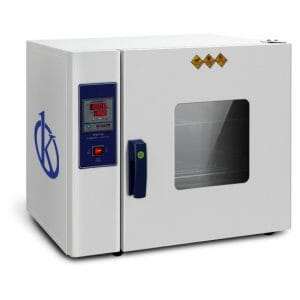ovens, also known as drying ovens, are devices used to dry and sterilize glass and metal containers used in various laboratory processes. Laboratory ovens allow to carry out the sterilization by dry heat, where the hot air is used to carry out this process, these equipments allow a uniform distribution of the heat inside, where the material is exposed to temperatures of approximately 170ºC for 2 hours.
Dry heat sterilization works by destroying microorganisms by oxidation of their cellular components. This is a less efficient process than wet heat sterilization, because microorganisms die faster when they are in the presence of water, as this allows the configuration of their proteins to be altered more easily and provides a means to distribute heat evenly throughout the internal chamber of the sterilization equipment. For this reason, to achieve sterilization of the material using dry heat, higher temperatures should be applied for a longer time.
How is a laboratory ovens used to sterilize material?
To sterilize using hot air it is necessary to place the objects in a ovens . And bring the indoor air to a temperature between 150 and 190 °C. The sterilization time must be determined for each type of material, for example, in the case of materials quite resistant to heat, higher temperatures can be used for shorter periods of time.
One of the first equipment used for this purpose was the Pasteur oven, which was later replaced by hot air ovens . The drying ovens are composed of a double chamber, and the hot air produced by an electrical resistance circulates in the main cavity and in the space between both chambers, at variable temperatures, being the most recommended 170º C for the metal instrument and 140º C for the contents of the drums. A stable temperature is maintained through metal thermostats called bimetallic pair, consisting of two metals of different coefficient of expansion. When one dilates, the other does not and arches. One end of this device is in contact with a switch that cuts off the power to the heater resistor.
Advantages of using ovens sterilization
Among the advantages of this method of sterilization through the use of laboratory ovens , are that these equipment leave no waste, and is a fast, effective, safe and economical method.
This technique also allows the sterilization of materials not miscible with water, such as powders, oils and fats. It is not corrosive to metals and instruments, as it does not oxidize or corrode and the sharp edges do not lose the edge. Its main disadvantage is that it should only be used to sterilize thermostable materials and requires longer sterilization time, compared to humid heat, due to low heat penetration and the destruction of only thermolabile elements.
Recommendations for the use of laboratory ovens
- The ovens should not be opened during the sterilization cycle.
- Very bulky packages should not be made, because sterilization cannot be ensured due to the low penetration power of dry heat.
- It is not recommended to use the ovens to sterilize cotton or gauze, because high temperatures and exposure time damage the material.
- It is recommended to connect the equipment to a voltage regulator.
- Loads greater than 80% should not be used.
- Bacillus subtilis spores should be used for biological verification.
What does Kalstein offer you?
Kalstein is a company MANUFACTURER of medical and laboratory equipment of the highest quality and the best technology, at the best PRICES of the market, so you can make your PURCHASE with us, knowing that you have the service and advice of a company specialized in the field and committed to providing you with safe, economic and effective options for the performance of your functions in the right way.
This time we present our Electric Heating Drying ovens YR05248. This innovative equipment features intelligent micro-computer control, temperature control, synchronization, overheating alarm function; Fan forced convection hot air circulation system; optional stainless steel lining/cold rolled steel plate; shelf space and shelf number can be adjustable; High temperature resistant silicone to seal the door safe and reliable. Cost effective and highly recommended for use in routine laboratories. Suitable for hospitals and fields covering medicine, biology, agriculture, research and other drying departments. For more information we invite you to take a look HERE


